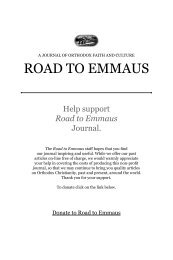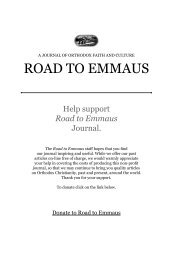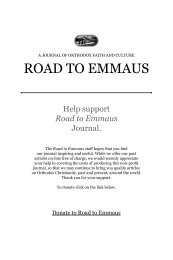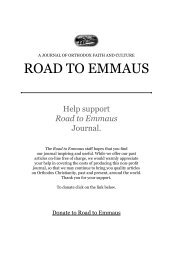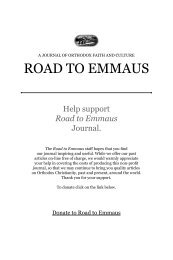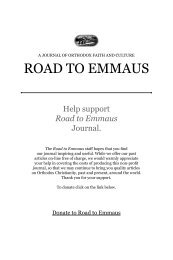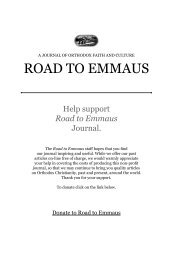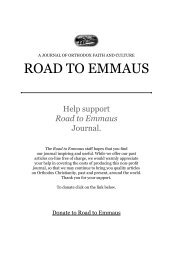RTE No 20 Interior - Road to Emmaus Journal
RTE No 20 Interior - Road to Emmaus Journal
RTE No 20 Interior - Road to Emmaus Journal
You also want an ePaper? Increase the reach of your titles
YUMPU automatically turns print PDFs into web optimized ePapers that Google loves.
<strong>Road</strong> <strong>to</strong> <strong>Emmaus</strong> Vol. VI, <strong>No</strong>. 2 (#21)FROM JAINISM TO ORTHODOXYhas a daughter my mother’s age, and I grew up with her two children. Ourfamily is very close. We meet often, and whenever there is a problem it onlytakes a phone call for everyone <strong>to</strong> gather. It was a good environment <strong>to</strong> growup in; you felt needed, you felt loved, not just by your immediate family butby all your relatives, no matter how far away they might be.<strong>RTE</strong>: You must have had a large house.ELESA: Yes. The family bungalow was built by my great-grandfather, and thenthe “new” section, a courtyard linking the two buildings, was added in the19<strong>20</strong>s by my grandfather, who was born in1901. It is a wonderful house. It has twentyrooms and is made of brick and s<strong>to</strong>ne,two s<strong>to</strong>ries with a terrace at the <strong>to</strong>p. Wehave a festival in India every January 14called Uttarayan, the “Kite-FlyingFestival,” and almost every house has aterrace on the roof from which you flykites. The house is surrounded bygrounds, with a shed on one side, whichwas originally a shelter for a buffalo andmilk cows. Later, it was turned in<strong>to</strong> agarage for my grandfather’s Studebaker. Behind the house there is an old well,an outhouse, and stables where he kept his horses and buggies.<strong>RTE</strong>: What was a typical day for you growing up?ELESA: Usually the mornings began with school, which some days was veryearly – at 7 a.m. – other days, it started at 10 and you had <strong>to</strong> have lunchbefore you went. In India, cooking is done very early in the morning, no<strong>to</strong>nly because the weather is hot, but also because the Jain monks and nunscome <strong>to</strong> the house <strong>to</strong> get food – they are not allowed <strong>to</strong> cook for themselves.They carry beautiful red earthenware pots like tiffins, separate little dishesstacked one on <strong>to</strong>p of another. They dress all in white and come each morning<strong>to</strong> the door <strong>to</strong> ask for whatever has been prepared. They can eat onlyfresh food, and since we don’t want <strong>to</strong> turn any of them away, we prepare itearly in the morning, as do all the families in the area. The monastics no<strong>to</strong>nly go <strong>to</strong> the houses of Jains, they also go <strong>to</strong> Hindus, who present themwith food as well. I’m not sure if they go <strong>to</strong> the Muslim neighbors asMuslims are usually not vegetarians, but they may. Jains are both vegetariansand pacifists.<strong>RTE</strong>: Wonderful. What other things made an impression on you growing up?ELESA: Part of the Indian cultural tradition is <strong>to</strong> show tremendous respect <strong>to</strong>your elders. <strong>No</strong>w, your elder can be anyone from a cousin who is six monthsolder than you <strong>to</strong> your grandfather, who is sixty years older than you. Forinstance, I would not call my cousin who is six months older than me onlyby her first name. I would use her first name and add “ben,” which means“Elder Sister,” at the end <strong>to</strong> indicate that she is older.SYMEON: Before our wedding, I once forgot<strong>to</strong> call Elesa’s uncle, Subash masa, Ijust called him Subash. I saw everyonetake a deep breath and I realized I’d madea mistake. They didn’t want <strong>to</strong> say anythingbecause they knew I’d just forgotten.ELESA: Yes, it’s an insult not <strong>to</strong> indicate therelationship with someone who is older.When I say the word, “Grandfather” or“Aunt” or “Elder Sister” I’m suggestingElesa with her mother and grandfather.respect. The other thing that is very differentis that we don’t say “Thank you” or “I’m sorry.” The words exist but theyaren’t used in vernacular speech. This doesn’t mean that we don’t thank orapologize, but the actual words, “Thank you” and “I’m sorry,” are so formal, soweighted with depth and meaning that you only use them on very importantand solemn occasions.<strong>RTE</strong>: Then how do you make those acknowledgements?ELESA: Through a <strong>to</strong>uch of the hand, through your eyes, or in the <strong>to</strong>ne of yourvoice. Another thing that is very different is that when you meet someone likeyour grandparent, who is an elder in years and not just in seniority, or on specialdays like New Year or the feast of one of the Jain prophets, you ask a blessing.The way we receive blessings is that we bend from the waist and <strong>to</strong>uchtheir feet. Then they put their hand on our head in blessing. Even now in theUnited States, if I am <strong>to</strong> take an exam I bow in front of my mother <strong>to</strong> receive45



